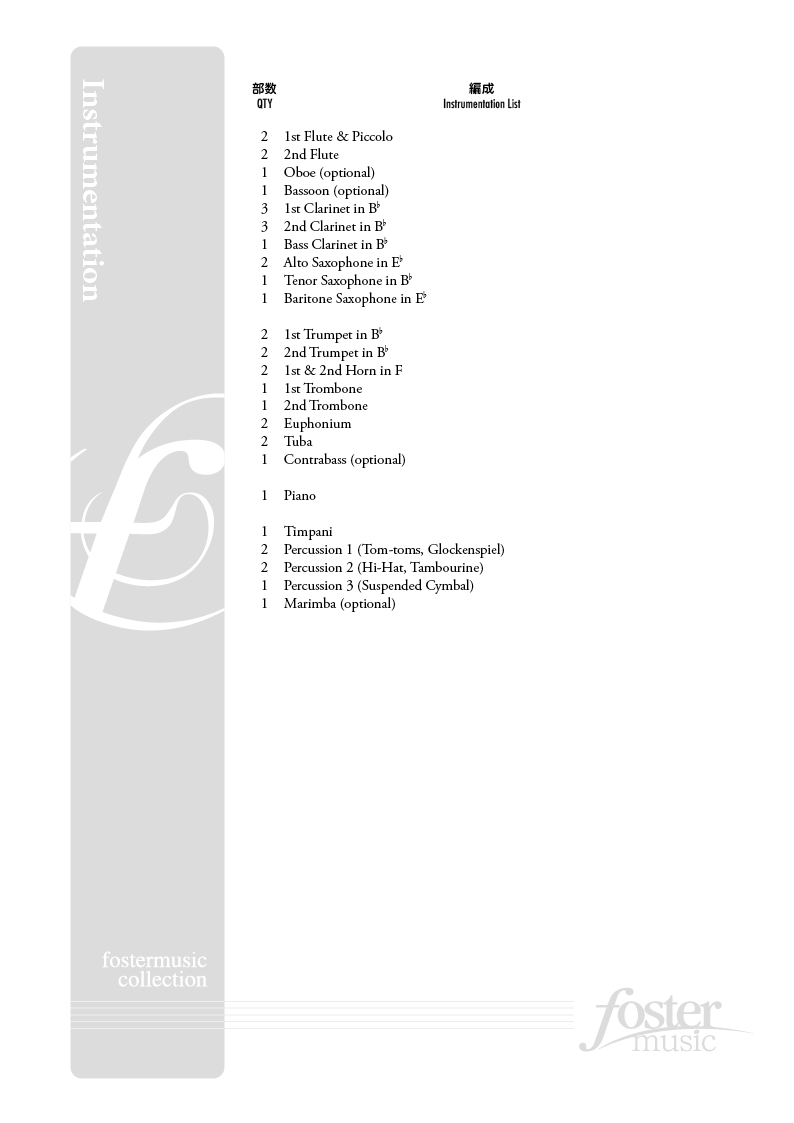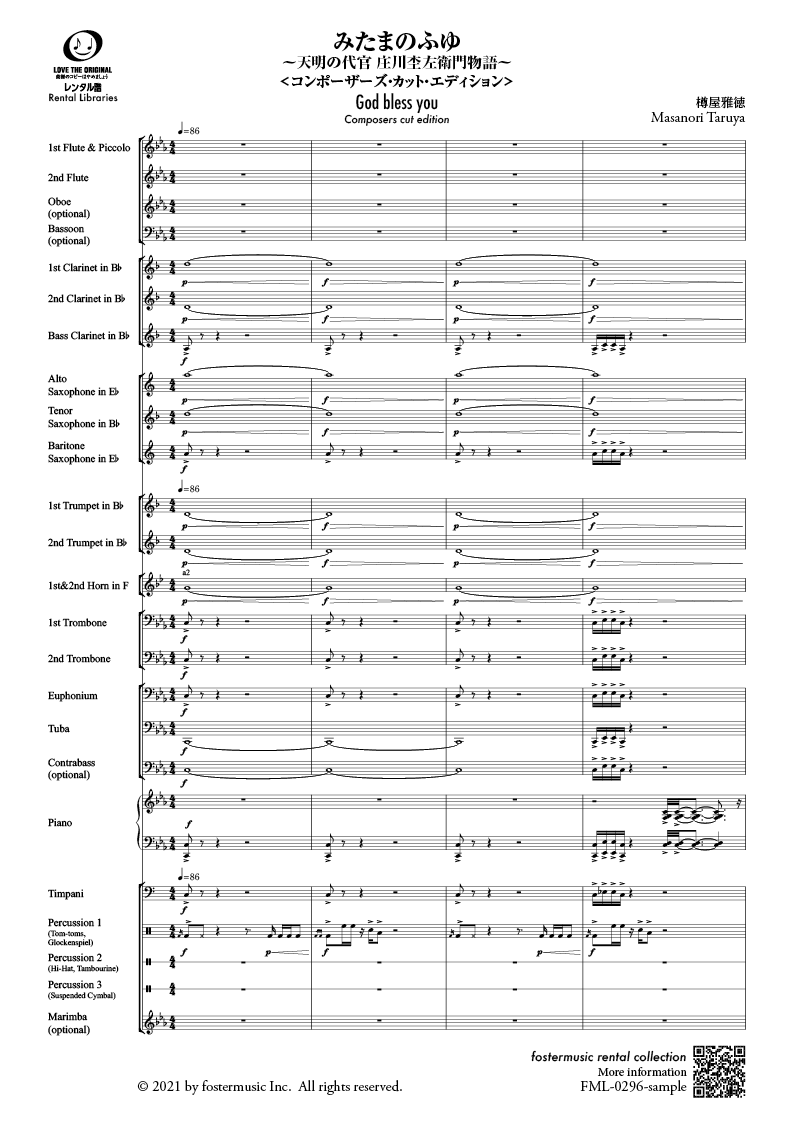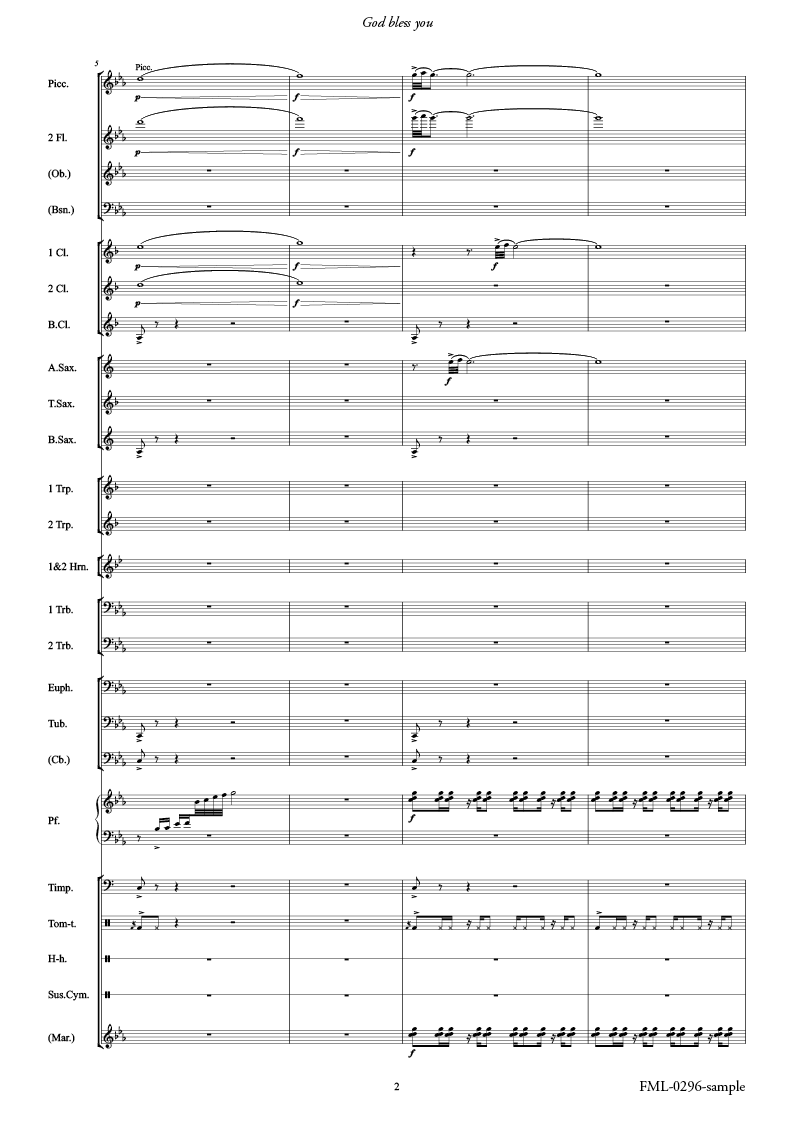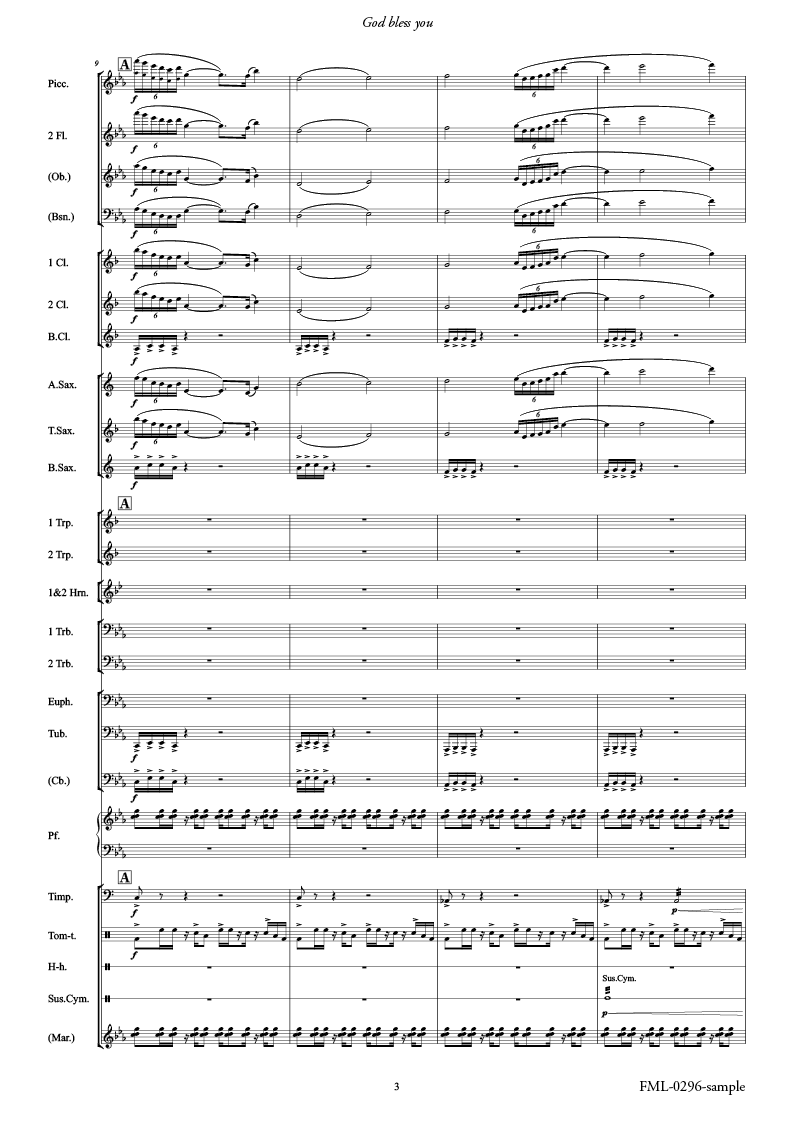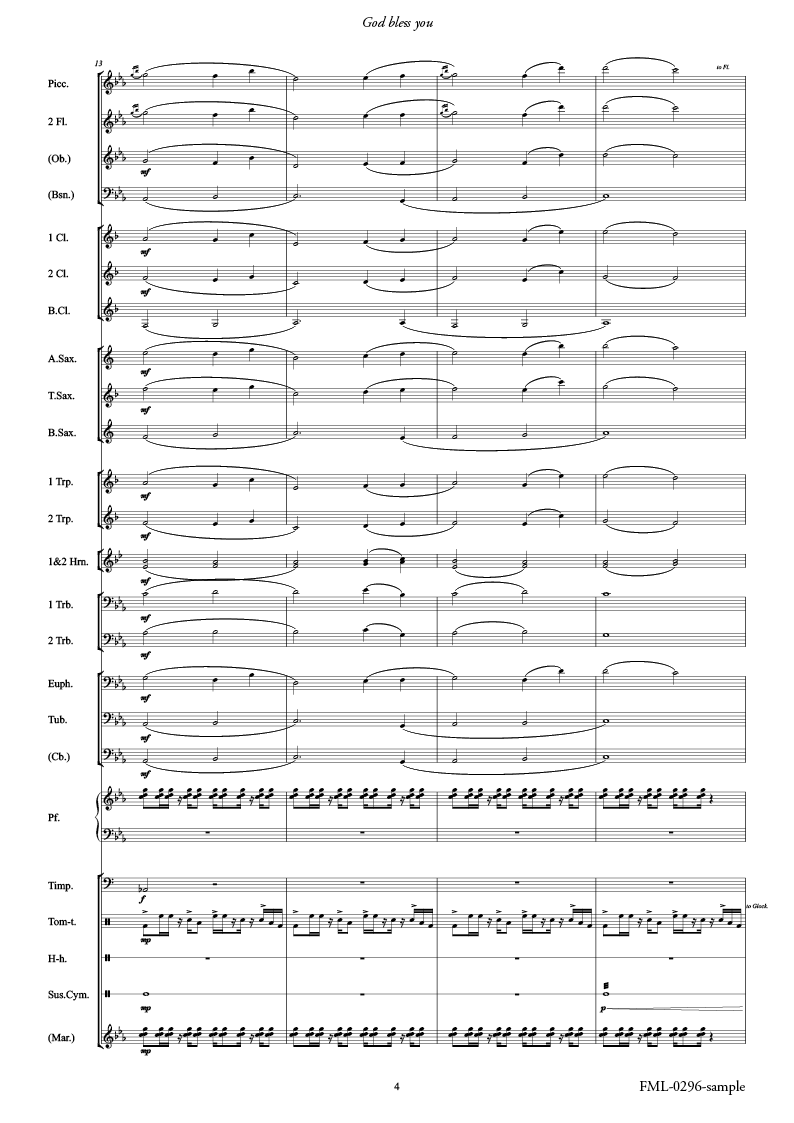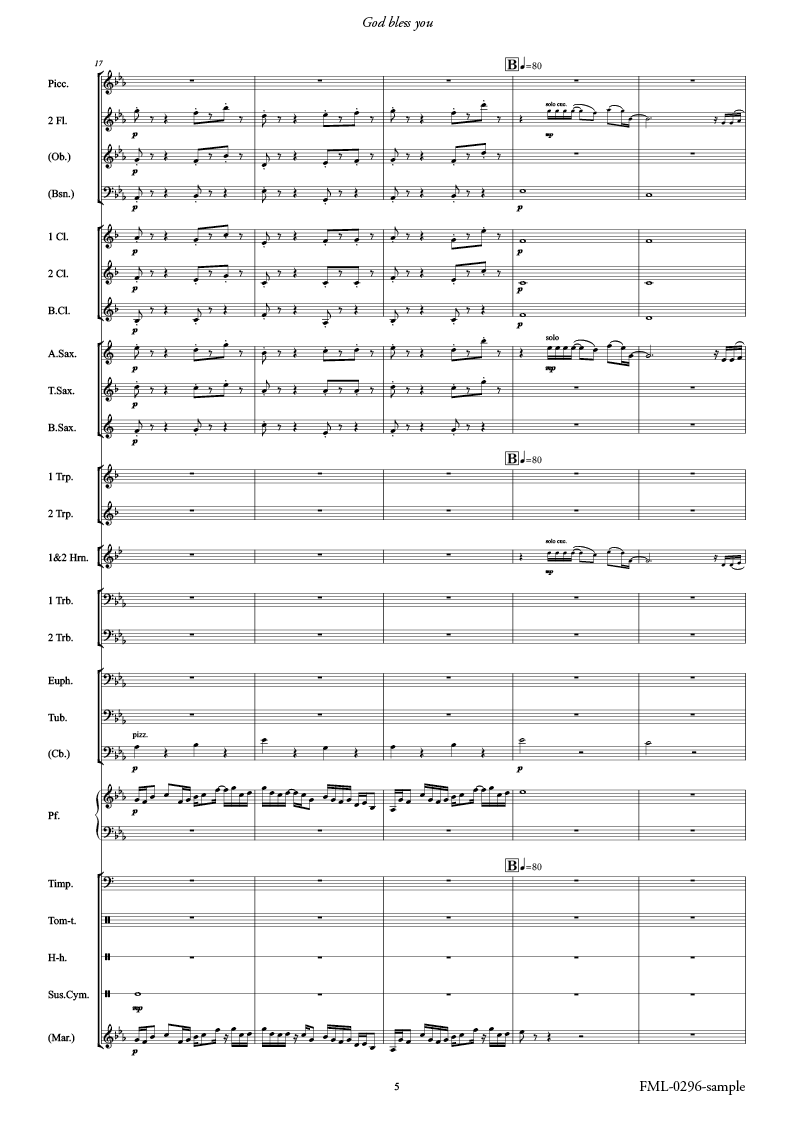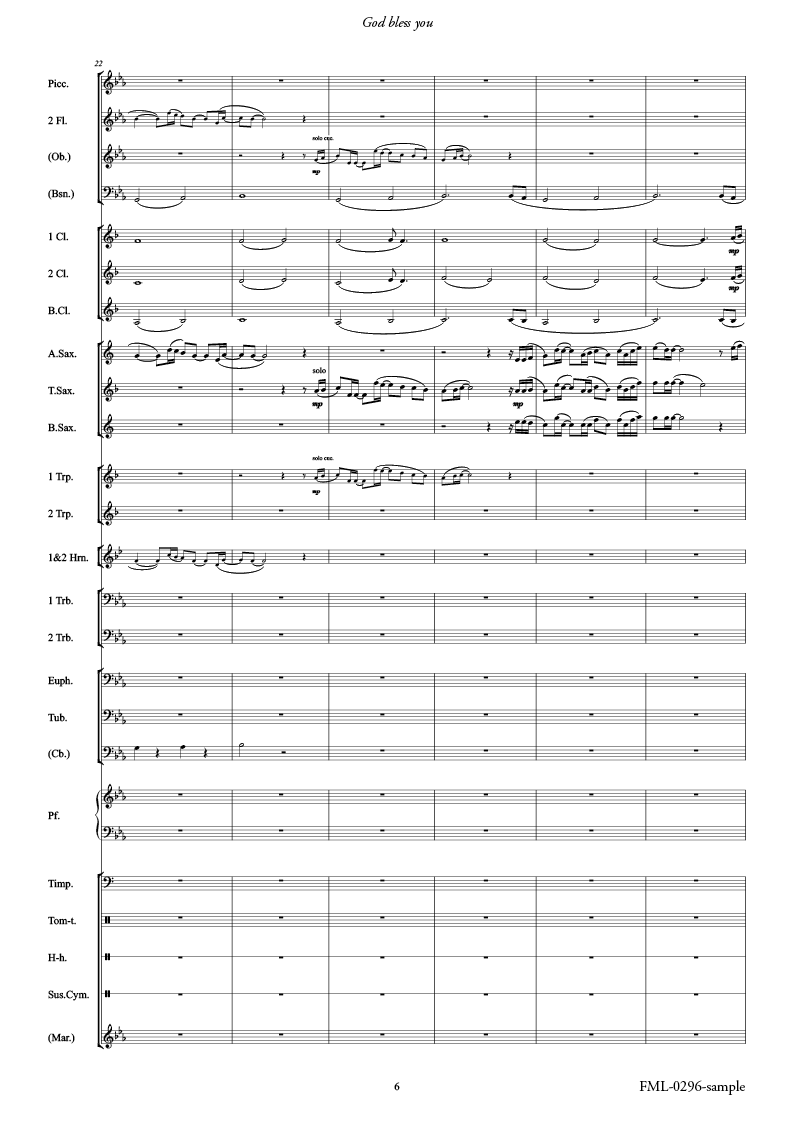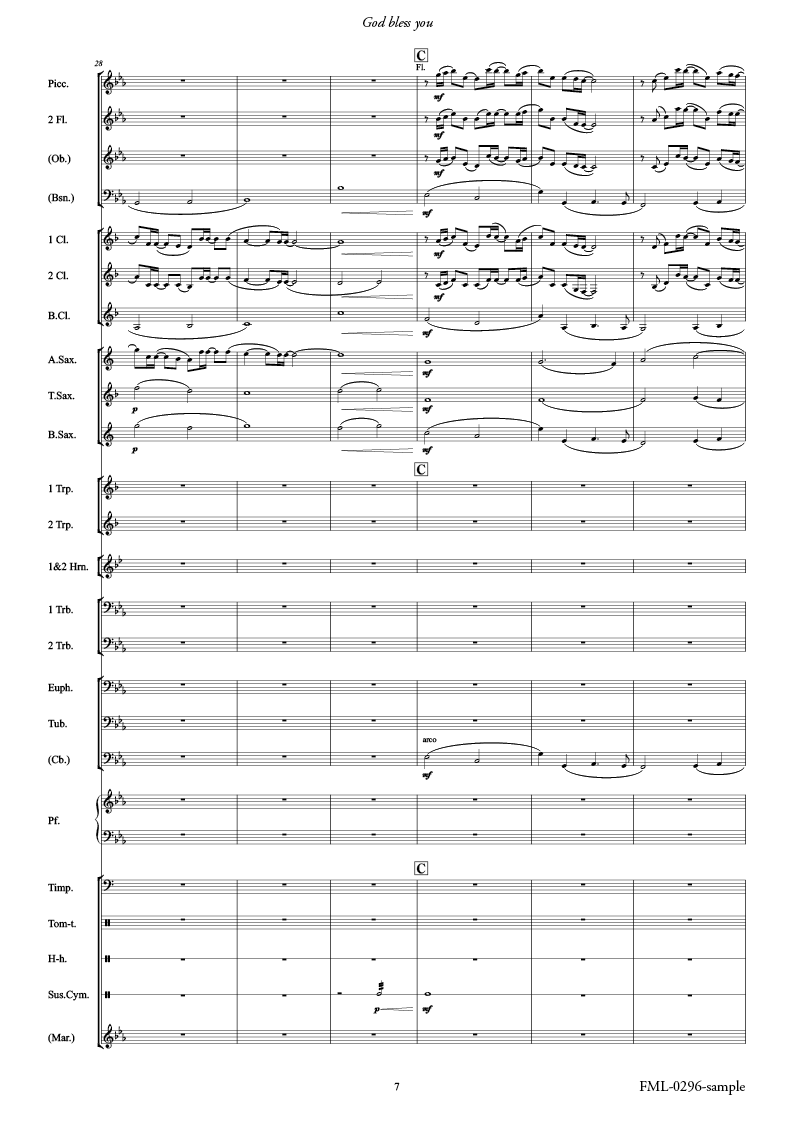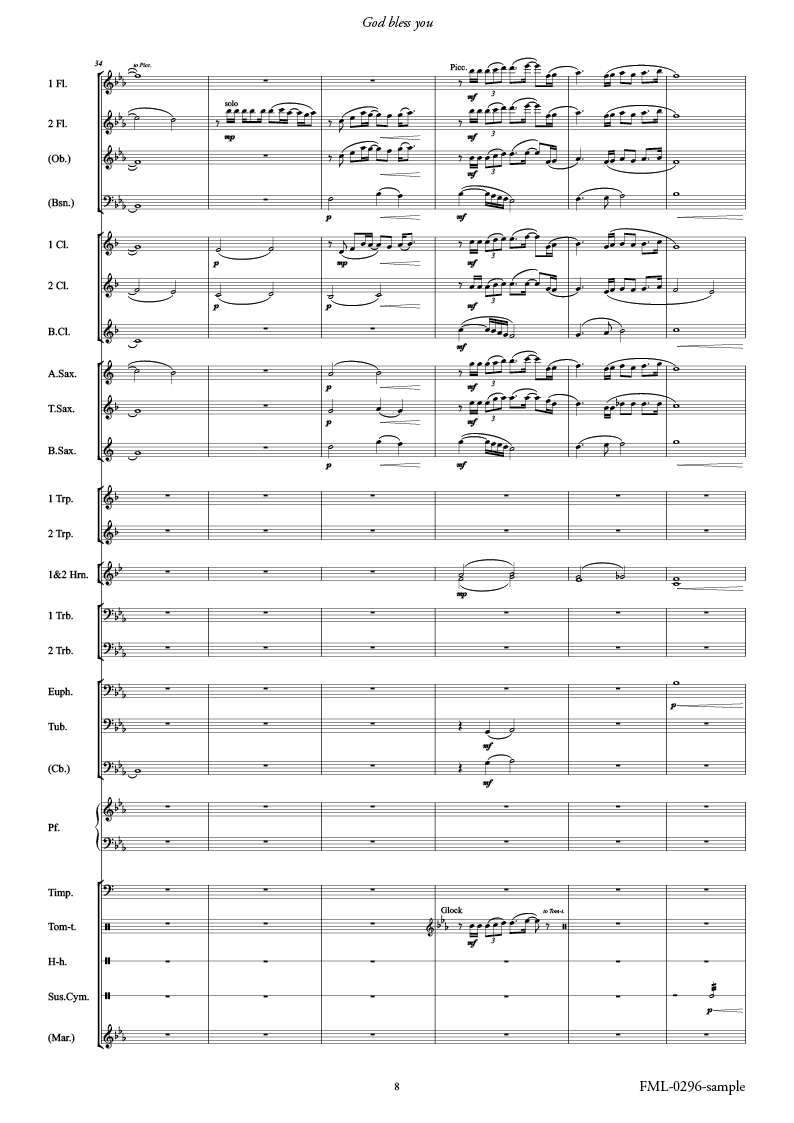みたまのふゆ~天明の代官 庄川杢左衛門物語~〈コンポーザーズ・カット・エディション〉:樽屋雅徳 [吹奏楽小編成-レンタル譜]
・1配送につき税込11,000円以上のご注文で国内送料無料
・コンビニ後払い、クレジットカード、銀行振込利用可
・[在庫あり]は営業日正午までのご注文で即日出荷
・International Shipping
- 作曲: 樽屋雅徳
- 編成:21 - 25パート
- 演奏時間:0:06:00
- グレード:3+
フォスターミュージック/FML-0296
- 概要
- 編成/曲目
- 補足
- ENGLISH
みたまのふゆ~天明の代官 庄川杢左衛門物語~〈コンポーザーズ・カット・エディション〉
私の地元である銚子市で、80周年記念事業として2014年8月に公演されたミュージカル、ちょうし市民ミュージカル「天明の代官」銚子を救った男 庄川杢左衛門物語 のために書き下ろした曲のハイライト版として構成し直したのが『みたまのふゆ』です。
物語は江戸時代、浅間山が噴火し農作物の不作により天明の大飢饉が起こりました。そんな中、独自の判断で藩の米蔵を解放し苦しむ領民を救った代官、それが高崎藩飯沼陣屋の代官・庄川杢左衛門でした。代官=庄川杢左衛門は、責任を問われ切腹したと言われていますが、正確な記録はなく歴史に埋もれてしまいました。しかし、銚子市民の間で僅かながらにも語り継がれ今でも彼を称える碑があります。そんな物語から「神様のお恵み、ご加護を...」という意味合いで使用される言葉『みたまのふゆ(恩頼)』と曲を名付けています。(樽屋雅徳)
この版は、2015年に出版された現行版(FML-0135)を元に、全日本吹奏楽コンクール小編成部門の編成と制限時間を基準に、オーケストレーションおよび構成を改訂したものです。
仕様
- アーティスト
- 作曲: 樽屋雅徳
- 演奏形態
- 吹奏楽
- 編成
- 小編成 / 21 - 25パート
- 演奏時間
- 0:06:00
- グレード
- 3+
- 商品形態
- レンタル譜(Full Score & Part)/レンタル楽譜ご利用案内
- 出版社 / 品番
- フォスターミュージック / FML-0296
- 発売日(年)
- 2021/04/22
- キーワード
- オリジナル, 壮大,
- 【スコア】みたまのふゆ 天明の代官 庄川杢左衛門物語 〈コンポーザーズ・カット・エディション〉:樽屋雅徳 [吹奏楽スコア]
スタディスコア/セット・版違いなど
楽器編成
- Full Score
- Flute 1 / doub. Piccolo
- Flute 2
- Oboe (optional)
- Bassoon (optional)
- Bb Clarinet 1
- Bb Clarinet 2
- Bass Clarinet
- Alto Saxophone
- Tenor Saxophone
- Baritone Saxophone
- Trumpet 1
- Trumpet 2
- Horn 1
- Horn 2
- Trombone 1
- Trombone 2
- Euphonium
- Tuba
- String Bass (optional)
- Timapni
- Percussion 1 (Tom-toms, Glockenspiel)
- Percussion 2 (Tamb., Hi-hat)
- Percussion 3 (Sus.Cym., Cymbals)
- Marimba (optional)
- Piano
樽屋雅徳(Masanori Taruya)
1978年千葉県銚子市生まれ。武蔵野音楽大学音楽学部作曲学科卒業。佐藤博、宮本良樹各氏に師事。
フランスで吹奏楽曲「Ardent Overture」を出版。代表作として「絵のない絵本」「民衆を導く自由の女神」「マゼランの未知なる大陸への挑戦」「ラザロの復活」「マードックからの最後の手紙」などがある。
全国の吹奏楽団やマーチングバンドからの委嘱も数多く、その作品の多くが国内外問わず広く演奏され、日本でもっとも人気のある作曲家のひとりである。また、作曲・編曲の傍ら、吹奏楽指導やコンクール等の審査員、執筆活動などでも多くの成果を挙げている。
2004年~2018年まで銚子市立銚子高等学校の音楽監督を務めマーチングコンテストで全国大会へ、吹奏楽コンクールでは東関東大会、東日本大会へと導く。
現在はベルモンテウィンドオーケストラの指揮者・音楽監督を務め、指導者としても高い評価を受けている。
- サイズ
- A4/3cm未満
GOD BLESS YOU (COMPOSERS CUT EDITION):Composer: Masanori TARUYA
"Mitamanofuyu" was rearranged as a digest version of a piece I had written for the Choshi City citizen musical "Tenmei no Daikan: The Story of Shokawa Mokuzaemon, the Man who Saved Choshi," which had been performed in August 2014 as a commemorative project for the 80th anniversary of the founding of Choshi City, my hometown.
The story that inspired this piece was set during the Great Tenmei famine that occurred in the Edo period (16031868) when the eruption of Mount Asama destroyed the surrounding crops. During the famine, the deputy governor of the Iinuma encampment of the Takasaki domain, Shokawa Mokuzaemon, exercised his independent judgment to draw on the domain's rice reserves to relieve the suffering of the people. Shokawa Mokuzaemon is said to have committed seppuku in response to being held accountable for his actions, but there has been no reliable record of the facts, which have been buried in the depths of history. However, at the very least, this story has been passed down to the current residents of Choshi City, where a monument has been set up in his honor. This piece has been entitled "Mitamanofuyu," a phrase from the story that means "God bless you."
This arrangement is based on the current version (FML0135) published in 2015, and its orchestration and structure have been revised to satisfy the orchestration and duration requirements of the Small Band category of the AllJapan Band Competition.
Specifications
- ARTIST
- Composer: Masanori TARUYA
- INSTRUMENTATION
- Windband / 16-25 Players
- DURATION
- 0:06:00
- GRADE
- 3+
- PRODUCT TYPE
- Set / RENTAL (Full Score & Part)
- PUBLISHER / Code
- fostermusic Inc. / FML-0296
- RELEASE
- 2021/04/22
- OVERSEAS SHIPMENT
- Yes
- EUROPEAN PARTS
- Not Included

![みたまのふゆ~天明の代官 庄川杢左衛門物語~〈コンポーザーズ・カット・エディション〉:樽屋雅徳 [吹奏楽小編成-レンタル譜]](/html/upload/save_image/FML0296_1.png)
